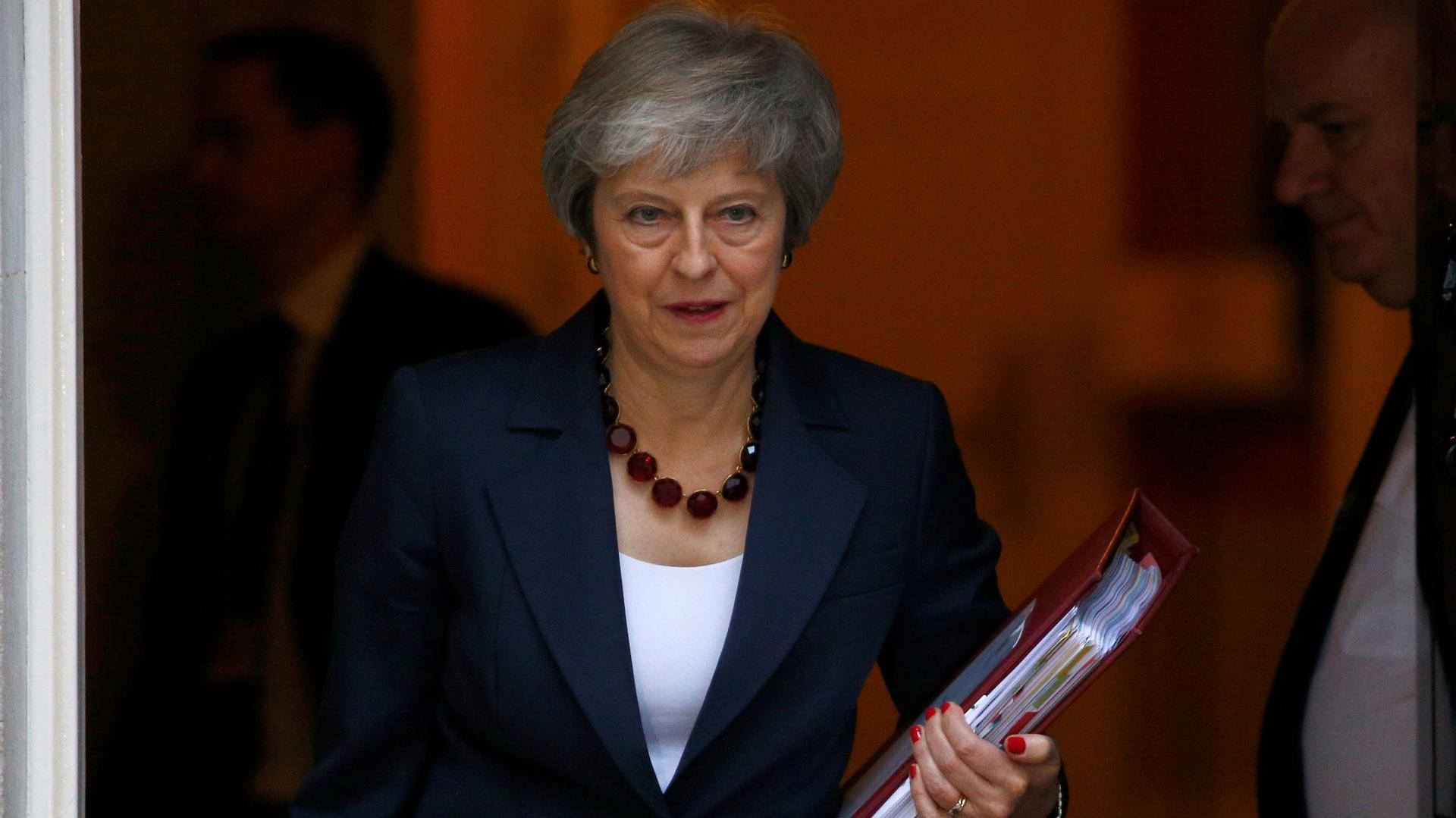British Prime Minister Theresa May tries to sell Brexit deal to ministers
Britain’s Prime Minister, Theresa May, leaves 10 Downing Street, in London, Nov. 14, 2018.
British Prime Minister Theresa May, who is facing a March 29, 2019 deadline, will try to convince senior ministers on Wednesday to accept a draft Brexit deal.
Brexit campaigners in May’s Conservative Party accused her of surrendering to the EU and said they would vote down the deal. The Northern Irish Democratic Unionist Party (DUP) which props up May’s minority government questioned whether she would be able to get parliamentary approval.
“It’s a question of whether we are separating the union, whether we are dealing with the United Kingdom in a way that leaves us adrift in the future and, as the leader of unionism in Northern Ireland, I’m not about to agree to that,” DUP leader Arlene Foster told Sky News.
The British cabinet will meet at 9 a.m. ET on Wednesday.
Five of May’s senior ministers Dominic Raab, Jeremy Hunt, Sajid Javid, Michael Gove and Geoffrey Cox will back the deal, said the Sun newspaper’s political editor Tom Newton Dunn.
EU leaders could meet on Nov. 25 for a summit to seal the Brexit deal if May’s cabinet approves the text, diplomatic sources said.
For the EU, reeling from successive crises over debt and immigration, the loss of Britain is the biggest blow yet to 60 years of efforts to forge European unity in the wake of two world wars.
The ultimate outcome for the United Kingdom remains uncertain: scenarios range from a calm divorce to rejection of May’s deal and potentially sinking her premiership and leaving the bloc with no agreement, or even another referendum.
Surrender?
May, an initial opponent of Brexit who won the top job in the turmoil following the 2016 referendum, has staked her future on a deal which she hopes will solve the Brexit riddle: leaving the EU while preserving the closest possible ties.
Far from garnering broad support, May’s plans so far have upset Brexit campaigners, EU supporters, Scottish nationalists, the DUP and some of her own ministers.
The government gave no immediate details on the Brexit deal text, which runs to hundreds of pages.
At the heart of conflict among UK politicians has been the so-called Northern Irish backstop, an insurance policy to avoid a return to controls between the British province and EU-member Ireland which could threaten the 1998 peace accord which ended 30 years of violence.
EU sources said the draft accord envisages a July 2020 decision on what would have to be done to safeguard an open Irish border after the post-Brexit transition runs its course if a new trade deal is not in place.
If not, Britain would have two choices. Extending the transition period once beyond December 2020, possibly until the end of 2021, or going into a customs arrangement that would cover all of the United Kingdom but in which Northern Ireland would be aligned more closely with the EU’s customs rules and production standards.
Treating Northern Ireland differently risks alienating the DUP, while Brexit campaigners such as former foreign secretary Boris Johnson said they would oppose the deal, arguing it would leave Britain subject to EU rules indefinitely.
“Anyone with a modicum of intelligence knows that once we’ve handed over the divorce bill and signed the withdrawal agreement, we’ve lost all leverage and all the EU will offer us is the backstop which we’ll be stuck in in perpetuity,” lawmaker Andrew Bridgen said.
May’s Brexit
But Conservative lawmakers also have to factor in the implications of defeating a deal: To do so could topple May, delay Brexit, pave the way for a national election, or, as many opponents of Brexit hope, a new EU referendum.
Brexit will pitch the world’s fifth largest economy into the unknown and many fear it will serve to divide the West as it grapples with both the unconventional US presidency of Donald Trump and growing assertiveness from Russia and China.
Supporters argue that while the divorce might bring some short-term instability, in the longer term it will allow the United Kingdom to thrive and strike new global trade deals, while enabling deeper EU integration without such a powerful reluctant member.
Some business chiefs, who have repeatedly warned about the damage and chaos that exiting with no deal would cause, were positive about May’s deal.
“My gut feeling is we need to get behind it and we need to make this deal work. What we need is certainty,” said Juergen Maier, the UK CEO of German engineering giant Siemens.
By William James and Kylie MacLellan/Reuters
Additional reporting by Elizabeth Piper; Writing by Guy Faulconbridge and Michael Holden; Editing by Janet Lawrence.
Our coverage reaches millions each week, but only a small fraction of listeners contribute to sustain our program. We still need 224 more people to donate $100 or $10/monthly to unlock our $67,000 match. Will you help us get there today?
